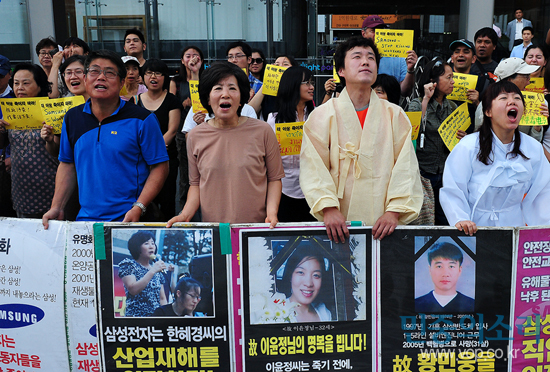The battle of Samsung and what you can do about it

Anti-Samsung rally. Image: stopsamsung.com
Samsung has been in more than a spot of bother over the last year. In October 2016, just two months after its release, the latest model in Samsung’s flagship Galaxy Note series was discontinued, as batteries within the phones had been causing them to combust. Exploding phones caused Samsung to lose its coveted spot as the smartphone vendor with the largest portion of global market share, falling behind Apple in the last quarter of 2016 for the first time since 2011.
Samsung’s corner cutting and dangerous practices haven’t been reserved solely for consumers either – they’ve hit their workforce too, seeing them replace Foxconn as the poster child of worker rights abuses in the electronics industry. A group of workers, their families and trade unionists – Supporters for the Health and Rights of People in the Semiconductor industry (SHARPS) – have been staging a sit-in at Samsung’s South Korean global exhibition space for over a year. SHARPS accuse Samsung of causing the death of more than 70 factory workers, and occupational disease of many others due to their exposure to toxic chemicals without adequate protection and are fighting for compensation for workers and their families, as well as for a full disclosure of the chemicals Samsung has required workers to use in manufacturing. Earlier this year a South Korean court confirmed that the Korean Workers Compensation and Welfare Service should pay compensation to an LCD worker – Kim Mi-seon, for Multiple Sclerosis she suffered through her work at Samsung – the first ruling of its kind.
SHARPS campaign is not an isolated case. In October, the International Trade Union Congress (ITUC) released a damning report on working conditions across all of Samsung’s supply chains, from China to Brazil and from South Korea to Indonesia. One of the most concerning allegations in the report is that Samsung operate a ‘no-union’ policy in its own factories and actively seeks to prevent the formation of unions at its suppliers. Attempts to restrict freedom of association are common with much of the global manufacturing industry, but few companies have been as effective as Samsung at achieving it. In 2014, it was estimated that across Samsung’s entire supply chain in South Korea, just 300 workers were members of trade unions. Samsung Electronics directly employs more than 300,000 people.
Samsung’s ability to suffer relative impunity is a direct result of the significance the company has in South Korea’s economic and political system. The centrality of the company to the economy of South Korea allows their practices to go unchallenged. Samsung is gargantuan monolith that is responsible for more than a quarter of South Korean exports, has an annual revenue exceeding the GDP of Cambodia and Honduras , and is responsible for almost a fifth of South Korean GDP. Samsung is the largest of the ‘chaebols’ – vast, Korean, family run conglomerates which are often accused of engaging in aggressive monopolisitc behaviour and asserting significant influence over government officials and policy. So unfathomably large is Samsung, and so wide its influence, a common joke among South Koreans is to refer to their country as the ‘Republic of Samsung.’
Since the 1997 economic crisis that affected South Korea, along with other so called ‘Tiger Economies’ of East Asia, much has been written of the declining political influence of South Korea’s chaebols. The state no longer has a majority stake in any chaebol and numerous executives have been charged and convicted for white collar crime. In spite of this, the few CEOs found to have engaged in embezzlement, bribery, fraud and tax avoidance have been granted pardons or offered laughably lenient sentences.
The true extent of corruption within the South Korean political system is slowly being revealed in the scandal that engulfed the currently suspended and impeached President Park. The scandal began to emerge at the close of 2016, with allegations that Choi Soon-sil, an associate of the president with no official government position, was granted access to confidential government documents, exerted influence over key aspects of state policy and extorted millions of dollars from the chaebols. As the scandal has boiled over into 2017, Samsung’s heir apparent Lee Jae-yong was arrested on February 16th, with authorities alleging over $30 million were paid by Lee to Choi Soon-sil in return for political favours in addition to accusations of embezzlement and perjury.
This isn’t the company’s first major run-in with the law. Lee Jae-yong’s father previously faced allegations of bribery of prosecutors, judges and political figures in 2008. He was sentenced to an almost $100 million fine and a suspended jail sentence after having been found guilty of financial wrongdoing and tax evasion, but was later pardoned by the then President of South Korea.
Only time will tell if this corruption scandal will cause more lasting damage to the political system and the chaebols that prop it up. Pressure is coming both from outside traditional structures, with up to 2 million people regularly taking to the streets in South Korea in protest over the scandal, and in the courts. Perhaps the time has finally come for long overdue reform of the political and business models of South Korea. With it, there would come a unique opportunity to ensure the dignity and rights of workers across the country, but specifically at Samsung.
In the meantime, the ITUC has gathered nearly 15,000 petition signatures calling for the abolition of Samsung’s no-union policy, and students across the UK and Ireland are taking action against and applying direct pressure to Samsung over the next two weeks, as international solidarity with Samsung workers grows. At a time when Samsung is under intense media scrutiny, we have a real chance of putting pressure on the company to improve working conditions within their supply chain.
Samsung and the struggle to hold them to account is a key example of how public procurement is being used in solidarity with local organisers to put pressure on companies and defend workers’ rights around the world: with people across the UK campaigning to get their college, university, local authority or other public body to join Electronics Watch, an independent labour monitoring organisation in the ICT industry.
You can sign the ITUC’s petition here.






